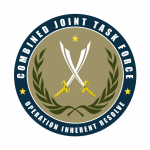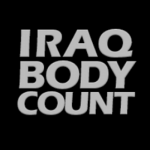We asked key experts who have been closely following the Coalition’s military campaign against so-called Islamic State what 1,000 days of war means to them. Here’s what they had to say.
Fadel Abdul Ghany, director of the Syrian Network for Human Rights
 After 1,000 days have passed since the beginning of the international coalition forces’ raids against Daesh, I believe that the human cost has been high if we consider what was achieved in terms of destroying headquarters and undermining their manpower. We believe that it is in no way justifiable to cause this high level of casualties, not to mention the extent of the material losses.
After 1,000 days have passed since the beginning of the international coalition forces’ raids against Daesh, I believe that the human cost has been high if we consider what was achieved in terms of destroying headquarters and undermining their manpower. We believe that it is in no way justifiable to cause this high level of casualties, not to mention the extent of the material losses.
Several days ago, we issued a report on the bombing of bridges by international coalition forces in the governorate of Deir Ez Zawr. This is a simple indicator of what we believe to be negligence, and the result of the lack of accountability. By not identifying who in the Coalition forces is committing the massacres in Syria, and not offering frank and clear apologies or starting to compensate the victims, it is implied that there are no consequences to such flagrant violations. This has given the military command a green light, promoting a culture where there is no real interest in taking careful decisions or carrying out serious investigations.
Colonel Joseph Scrocca, Coalition Director of Public Affairs
 Since 2014, the global coalition of 68 international partners has supported our partner forces in Iraq and Syria with more than 21,000 strikes against ISIS fighters, equipment and resources. These strikes allowed our partner forces to liberate 50,000 square kilometers of territory and more than a million people; and are helping to ensure the peace and security of the region and all our homelands.
Since 2014, the global coalition of 68 international partners has supported our partner forces in Iraq and Syria with more than 21,000 strikes against ISIS fighters, equipment and resources. These strikes allowed our partner forces to liberate 50,000 square kilometers of territory and more than a million people; and are helping to ensure the peace and security of the region and all our homelands.
Our goal is always for zero civilian casualties. Coalition forces comply with the law of armed conflict and take extraordinary efforts to strike military targets in a manner that minimizes the risk of civilian casualties.
The Coalition takes all allegations of civilian casualties seriously and goes to great lengths to ensure transparency in our assessment and reporting processes. ISIS is the cause of massive human suffering and the greatest threat to the people of Iraq, Syria, and the world, and they must be defeated.
Belkis Wilke, Senior Iraq researcher at Human Rights Watch
 For the last 1,000 days we have seen a broad coalition of states, led by the United States, supporting Iraqi, Kurdish, and non-state armed groups in military operations against ISIS in Iraq and Syria. A mounting number of civilian deaths over recent months has raised concerns about the way the battle against ISIS is being fought. Iraqi, Kurdish, and other ground forces supported by the coalition have been responsible for serious violations including enforced disappearances, forced displacement, and the use of child soldiers.
For the last 1,000 days we have seen a broad coalition of states, led by the United States, supporting Iraqi, Kurdish, and non-state armed groups in military operations against ISIS in Iraq and Syria. A mounting number of civilian deaths over recent months has raised concerns about the way the battle against ISIS is being fought. Iraqi, Kurdish, and other ground forces supported by the coalition have been responsible for serious violations including enforced disappearances, forced displacement, and the use of child soldiers.
The coalition should take all feasible precautions to minimize civilian loss and should thoroughly and transparently investigate reported civilian deaths, and in the case of wrongdoing, hold those responsible to account. Coalition members should investigate whether foreign military assistance contributed to laws-of-war violations and should end military assistance to units repeatedly involved in violations. They should also use their leverage with parties they support on the ground to undertake credible investigations into alleged war crimes and hold perpetrators to account.
Micah Zenko, Senior Fellow at the Council on Foreign Relations
 It is really an air campaign created for today’s media age: releasing daily strikes totals, routinely declaring estimates of enemy combatants and civilians killed, and posting always-flawless video clips. This data and imagery shapes perceptions of the war by feeding the insatiable demands for information. It is as if the lens through which the outside world sees the war is as important a mission as finding and striking the enemy.
It is really an air campaign created for today’s media age: releasing daily strikes totals, routinely declaring estimates of enemy combatants and civilians killed, and posting always-flawless video clips. This data and imagery shapes perceptions of the war by feeding the insatiable demands for information. It is as if the lens through which the outside world sees the war is as important a mission as finding and striking the enemy.
Lily Hamourtziadou, Iraq Body Count
 What was the coalition’s strategy, what were its objectives in embarking on another military campaign of air strikes over Iraq? Compellence, posturing and, mostly, offence seem to be the objectives, all of which contain their own political, ethical, and economic strategic goals and implications. After 1,000 days of striking, at least 49,081 civilians have been killed overall in Iraq, of which over 26,000 have been killed by Islamic State forces and 5,318 by the coalition.
What was the coalition’s strategy, what were its objectives in embarking on another military campaign of air strikes over Iraq? Compellence, posturing and, mostly, offence seem to be the objectives, all of which contain their own political, ethical, and economic strategic goals and implications. After 1,000 days of striking, at least 49,081 civilians have been killed overall in Iraq, of which over 26,000 have been killed by Islamic State forces and 5,318 by the coalition.
If the objectives were the extermination of IS, or their retreat, surrender, or confinement, the campaign has failed; if the objectives were the protection of civilians and the provision of stability, the campaign has failed; if the objectives were the demonstration of military might and political and technological superiority, the campaign has failed; if the objectives were the control of resources, finances and regimes, the campaign has failed. If on day 1,001 and on day 1,002 and on day 1,003, and every day, more civilians die from shelling, air strikes, IEDs, suicide bombers, car bombs or executions, the campaign has failed. No victory can come at such a human cost.
Hassan Hassan, Senior Fellow at Tahrir Institute for Middle East Policy
 My hometown is still under ISIS control, and has been since the summer of 2014. With some exceptions, civilians there often praise the US strikes especially if compared to Russian and regime bombings in Syria. Most complaints I hear are about the destruction of infrastructure like bridges, roads and oil facilities. Civilians in those areas had lived on a wartime economy that was functioning before ISIS took control, but the airstrikes disrupted that without providing alternatives to the people there.
My hometown is still under ISIS control, and has been since the summer of 2014. With some exceptions, civilians there often praise the US strikes especially if compared to Russian and regime bombings in Syria. Most complaints I hear are about the destruction of infrastructure like bridges, roads and oil facilities. Civilians in those areas had lived on a wartime economy that was functioning before ISIS took control, but the airstrikes disrupted that without providing alternatives to the people there.James Rodehaver, coordinator, Independent International Commission of Inquiry on Syria
 The Commission has noted repeatedly that while civilian protection should be a paramount concern for all parties to the conflict, it is often noticeably absent. All parties using air power in the Syrian armed conflict must adhere to the laws of war and core civilian protection principles of distinction and proportionality in the use of such weaponry under international humanitarian law. All means necessary should be employed to distinguish properly between civilian and military targets and to respect protected sites, particularly hospitals, medical personnel, mosques and religious objects, and schools.
The Commission has noted repeatedly that while civilian protection should be a paramount concern for all parties to the conflict, it is often noticeably absent. All parties using air power in the Syrian armed conflict must adhere to the laws of war and core civilian protection principles of distinction and proportionality in the use of such weaponry under international humanitarian law. All means necessary should be employed to distinguish properly between civilian and military targets and to respect protected sites, particularly hospitals, medical personnel, mosques and religious objects, and schools.
The Commission has opened investigations into incidents of civilian casualties caused by all parties to the conflict, including civilian deaths and injuries resulting from air strikes. We only publish findings from our investigations once we have been able to gather evidence to meet our legal standard of proof.
Violations Documentation Centre
 The Violations Documentation Centre confirms that, during almost three years, the International Coalition forces failed, in many instances, to respect the principles of International Humanitarian Law (IHL). A number of the attacks carried out against the so-called Islamic State, breached the principle of “Proportionality in Attack” of Rule 14 of customary IHL against the targets, and caused many civilian deaths most of which are elderlies and children – in addition to many injured and missing people. Additionally, the coalition forces breached on many occasions the principle of distinction between military and civilian targets and failed in estimating the collateral damage in civilian lives. The verified direct testimonies VDC collects after each attack, confirm that many of them did not prove to be of any military importance for the International coalition.
The Violations Documentation Centre confirms that, during almost three years, the International Coalition forces failed, in many instances, to respect the principles of International Humanitarian Law (IHL). A number of the attacks carried out against the so-called Islamic State, breached the principle of “Proportionality in Attack” of Rule 14 of customary IHL against the targets, and caused many civilian deaths most of which are elderlies and children – in addition to many injured and missing people. Additionally, the coalition forces breached on many occasions the principle of distinction between military and civilian targets and failed in estimating the collateral damage in civilian lives. The verified direct testimonies VDC collects after each attack, confirm that many of them did not prove to be of any military importance for the International coalition.
Thus, VDC reminds all conflict parties in the “International Coalition against the Islamic State in Iraq and Sham”, of the absolute requirement, under IHL, to avoid targeting civilians and that targeting civilians is a described war crime. The VDC calls for the sparing of civilians completely in accordance with the 1949 Geneva Conventions, the first and second additional protocols of 1977, and the rules of customary International Humanitarian Law.
